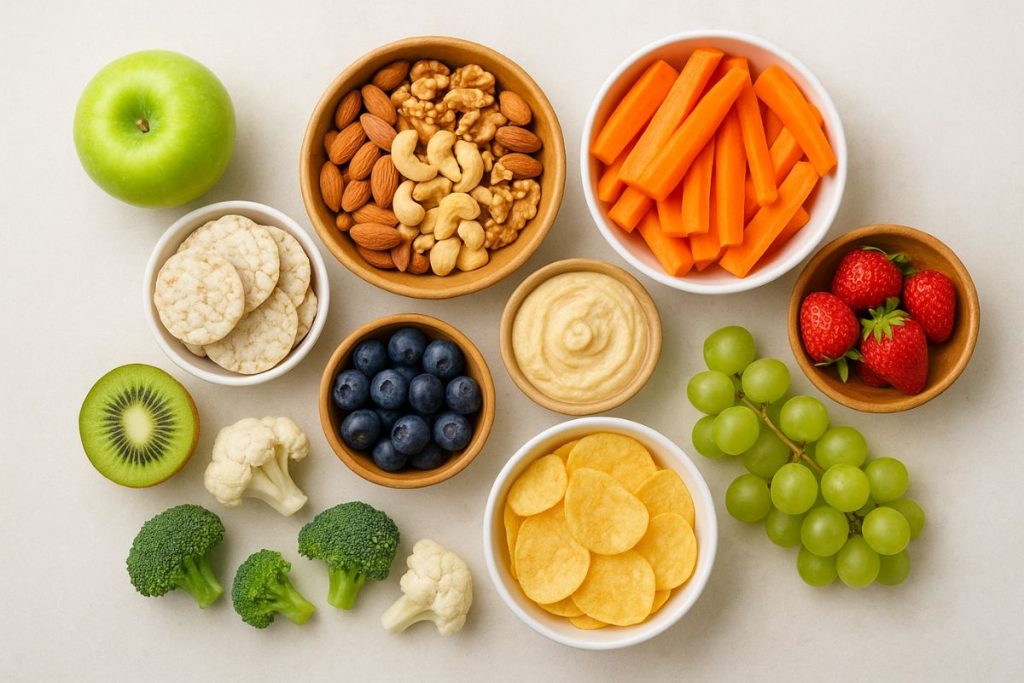Busy schedules often leave little time for balanced meals, making snacking a key way to stay fueled. However, research shows snacks now account for about 20-25% of Americans’ daily calories, and over 90% of adults eat at least one snack daily. Choosing healthy snacks is crucial: the right choices can boost energy and help meet nutrient needs, whereas junk food can derail your diet. For example, protein rich snacks not only satisfy hunger but have been shown to aid weight loss and stabilize blood sugar.
In contrast, high sugar or high fat snacks beyond your energy needs may contribute to weight gain and poor diet quality. By planning ahead with nutritious options, busy adults (and kids!) can curb cravings and maintain focus without excess calories.
Figure: A bowl of mixed fresh fruits (bananas, peaches, apples) makes a quick healthy snack. Fresh fruit provides fiber, vitamins, and natural sweetness to fuel busy days. Snack choices like fruit (a favorite sweet snack for children and adults) supply essential fiber and nutrients without added sugars.
In fact, health experts note that snacking on fruits and vegetables can help you reach recommended daily intakes of these foods. Keeping a fruit bowl on your desk or counter is an easy way to grab a nutritious snack and avoid vending machine temptations.
Why Healthy Snacking Matters
Snacks can complement meals by providing extra nutrients, but only if chosen wisely. One review found that nutrient rich snacks (fruits, dairy, whole grains) help people meet recommended intakes of vitamins, minerals, and fiber. On the other hand, routinely reaching for chips, cookies or sugary drinks can detract from diet quality and even fuel obesity. The American Heart Association advises pairing foods across groups: for example, whole grain crackers with nut butter (combining carbs and protein), or vegetables with hummus, to boost fullness and nutrients.
Protein and fiber are particularly powerful they slow digestion and curb hunger. In fact, a high protein snack can help you feel full longer and support weight management. For busy people, having balance in a snack (protein + fiber + healthy fat) is key. As one nutrition expert notes, snacks like cottage cheese, roasted chickpeas, protein bars, and turkey sticks are “high in protein and portable, making them great choices for busy days”.
Benefits of healthy snacks include:
- Sustained energy: Snacks with protein or fiber (like nuts or Greek yogurt) provide lasting fuel, preventing energy crashes between meals.
- Better nutrition: Strategic snacking (fruit, veggies, yogurt) can help fill nutrient gaps in the day.
- Weight control: Protein and fiber rich snacks curb overeating at the next meal.
- Blood sugar management: Combining small portions of carbs with protein/fat (cheese+crackers, apple+peanut butter) leads to gentler blood sugar rises, which is especially helpful for people managing diabetes or mood swings.
By focusing on whole foods and balanced snacks, you can snack healthfully. Experts advise choosing minimally processed foods with few additives, limiting added sugars and sodium. For example, instead of a candy bar or soda, reach for a smoothie, nuts, or yogurt parfait. Over time, smart snacking builds healthier habits and can even improve diet quality.
Top 10 Healthy Snack Ideas for Busy Days
- Greek Yogurt with Berries and Nuts. Greek yogurt is a top protein snack (about 17g protein per ¾ cup). It’s portable (individual cups are easy to grab) and pairs perfectly with fruits and nuts. Top plain Greek yogurt with berries, sliced banana, or a drizzle of honey for sweetness, plus a sprinkle of chopped nuts or seeds. This combination is filling and nutrient rich protein and calcium from yogurt, antioxidants from berries, and healthy fats from nuts. Compared to regular yogurt, Greek yogurt has roughly double the protein, making it especially good for weight control and muscle health. It’s a great healthy snack idea for weight loss and for kids’ snacks alike. Store bought options: single serve Greek yogurt cups or yogurt tubes (look for low added sugar).
- Mixed Nuts and Seeds. A handful of unsalted nuts (almonds, walnuts, pistachios) or seeds (pumpkin, sunflower) is a convenient protein snack. Nuts contain heart healthy fats, protein, and fiber to keep you satisfied. For even more nutrition, mix nuts with a few dried fruits (like raisins or dried cranberries) to make a homemade trail mix. Watch portions a ¼ cup serving of nuts is enough. These are also heart healthy snacks, as nuts provide unsaturated fats that support cholesterol levels. You can buy healthy snack packs of mixed nuts or seeds to keep at work. Remember: plain nuts are best (avoid heavily salted or sugar coated varieties).
- Veggies with Hummus or Yogurt Dip. Crunchy vegetables (carrot sticks, celery, cucumber, bell peppers) paired with hummus or a protein rich dip (like tzatziki or Greek yogurt ranch) make a vitamin packed snack. This idea covers healthy snack ideas for kids and adults kids love the crunch and dip, and it’s an easy way to sneak more veggies into their diet. Hummus provides plant protein and fiber (from chickpeas) plus healthy fats (olive oil, tahini). The American Heart Association specifically suggests vegetable sticks with hummus as a nutritious munchie. To buy: grab pre cut veggie snack packs or baby carrots, and pair them with individual hummus cups or make a quick yogurt dip (mix plain yogurt with herbs).
- Avocado and Whole Grain Toast. Spread ripe avocado on a slice of whole grain bread or rice cake. Avocado adds creamy texture, healthy monounsaturated fat, and fiber, while the bread provides complex carbs. This satisfying snack is perfect for healthy late night snacking or when you need longer satiety. You can top it with a sprinkle of salt and pepper, or add a sliced tomato or egg for extra protein. Avocado toast is quick to prepare at home; for busy days, smash avocado beforehand and refrigerate. This snack is a good example of a heart healthy snack (avocados support cholesterol) and a balanced choice for weight management (healthy fat + whole grain).
- Fruit Slices with Nut Butter. Nature’s candy! Sliced apples, pears, bananas, or berries paired with a tablespoon of nut butter (peanut, almond, cashew) or a sprinkle of nuts/seeds is a healthy sweet snack. The fruit provides natural sweetness, fiber and vitamins, while the nut butter adds protein and fat to keep you full. An apple with a smear of peanut butter also makes a great snack for diabetics (apple has fiber, PB adds protein). Bananas with almond butter are touted as a sleep friendly combo, too they contain nutrients that may boost melatonin levels. To buy: pre sliced apples (in apple sauce cups or snack packs) and individual nut butter packets are available at many stores.
- Hard Boiled Eggs. Eggs are an excellent on the go protein snack. Two large hard boiled eggs yield over 12g of high quality protein and are easy to prepare in advance. They’re also rich in nutrients like choline and vitamin B12. Toss an egg into your bag or keep a couple in the fridge at work. For variety, try a sliced egg on whole grain toast (avocado toast + egg!) or pair it with a small piece of fruit. Eggs are filling and have almost no carbs, making them ideal for low carb snack choices. (Tip: Many grocery stores sell pre cooked, peeled eggs for a quick healthy snack to buy.)
- Cheese and Whole Grain Crackers. Cheese (string cheese, cheese cubes, or cheese sticks) paired with whole grain crackers or crispbread is a balanced snack of protein, fat, and fiber. For example, 4 whole wheat crackers and one reduced fat cheese stick (28g) have about 8-10g protein and just ~150 calories. This combo helps steady blood sugar and promotes the production of sleep inducing tryptophan (so it’s also a good late night choice). It’s a convenient snack for kids (cheese is a kid friendly food) and adults. Look for crackers with at least 2-3g fiber and pair with low sodium cheese. The AHA even highlights crackers with low sodium tuna or cheese as a heart smart snack (tuna = protein + omega 3; cheese = calcium).
- Homemade Trail Mix. Create your own trail mix by combining nuts, seeds, whole grain cereal (like oatmeal squares or bran flakes), and a few dried fruits or dark chocolate chips. This mix delivers fiber, protein, and healthy fats. It’s customizable: for a healthy snack for weight loss, use a higher nut to fruit ratio and include some unsweetened coconut flakes or spices (cinnamon, cocoa nibs) for flavor. A portion of about ¼ cup is enough. Homemade trail mix is better than commercial granola bars (many of which contain added sugars). You can buy ingredients separately or look for “fitness” trail mix blends with minimal additives. Portion tip: pre-portion into small bags so you don’t overeat.
- Protein Smoothie or Greek Yogurt Parfait. A quick homemade smoothie (blend Greek yogurt or milk with fruit and even a handful of spinach) is a nutrient dense snack. It’s perfect on days when chewing is too much just drink it on the go. For instance, blend ½ cup Greek yogurt, ½ cup berries, and a scoop of protein powder or nut butter. This supplies protein, calcium, vitamins, and fiber. Smoothies can also be made in batches and kept in the fridge. Alternatively, layer Greek yogurt with oats or granola and fruit in a jar for an overnight parfait. This is a healthy snack recipe idea that kids often love.
- Roasted Chickpeas or Edamame. Crunchy roasted legumes are surprisingly filling and portable. A ½ cup of roasted chickpeas provides about 6-12g protein and 6g fiber. Similarly, dry roasted edamame (immature soybeans) packs around 11g protein and 4g fiber per serving. These plant based snacks help you feel fuller longer and make smart protein rich snacks for vegetarians or anyone seeking variety. Some supermarkets sell seasoned roasted chickpeas or edamame crisps (look for low sodium versions). Or toss canned chickpeas with olive oil and spices, then bake until crispy.
Each of the above snacks can be prepared ahead or grabbed prepackaged, making them ideal for busy schedules. Together they cover key nutrients (protein, fiber, healthy fats) and include options for sweetness or crunch to satisfy any craving. Rotate these ideas to keep snacking both interesting and nourishing.
Tailoring Snacks to Your Goals
Different needs call for different snacks. Here are targeted ideas:
- For Weight Loss or Management: Focus on low calorie, high protein/fiber snacks. Protein rich choices (Greek yogurt, eggs, cottage cheese) help curb appetite. Fiber from fruits, veggies, or whole grains keeps you full. Watch portions: pre portion nuts or trail mix. Avoid high sugar items that spike blood glucose. Pair foods (e.g. apple + nut butter, cheese + cucumber) to slow digestion. A registered dietitian notes that a higher protein snack routine can encourage weight loss and maintain muscle while dieting.
- High Protein Snacks: When you need extra protein (e.g. post workout), choose snacks like turkey or beef jerky, string cheese, Greek yogurt, hard boiled eggs, or a protein shake. A can of tuna (40g protein) or a protein bar (low sugar) is very filling. As a quick tip, cottage cheese cups (≈19g protein) and roasted edamame are also listed by experts as excellent protein snacks for busy folks. Balance them with vegetables or fruit to add fiber.
- Snacks for Diabetics: People with diabetes should aim for snacks that don’t spike blood sugar. Combine a moderate carb item with protein or fat. Good examples: raw veggies + hummus, apple slices + peanut butter, or whole grain crackers with cheese. The American Diabetes Association advises focusing on non starchy vegetables, lean proteins, and quality carbs. Avoid sugary drinks and candies. Instead of a sugary bar, grab a Greek yogurt parfait, cottage cheese with berries, or nuts and berries. Monitoring carb portions is key, so look for snacks around 15-30g carbs and pair them with protein.
- Heart Healthy Snacks: To protect cardiovascular health, include more plants and unsaturated fats. Snacks like sliced pear with low fat cottage cheese, veggie sticks with hummus, air popped popcorn, or unsalted nuts fit the bill. The AHA highlights fruit+nuts, vegetables+dip, and whole grain toast with nut butter as heart smart ideas. Aim for <2300mg sodium/day, so choose low sodium cheeses and nut butters. Fruits rich in antioxidants (berries, cherries) and omega 3 rich nuts (walnuts) are especially beneficial.
- Kids’ Snacks: Children love sweet and crunchy flavors. Offer healthy versions of treats: fruit kabobs, yogurt covered raisins, or whole grain cereal mixed with nuts. Colorful veggies with fun dips, cheese cubes, or nut butter on celery (“ants on a log”) can entice picky eaters. Keep portions kid sized. Involve kids in preparing snacks (e.g. building their own fruit and nut mix) to encourage them to try nutritious options.
- Healthy Sweet Snacks: When a sweet tooth hits, reach for natural sugars plus nutrition. Fresh fruit with a dollop of yogurt, baked apple with cinnamon, or a square of dark chocolate with nuts are better choices. Dates stuffed with almond butter or Greek yogurt with honey also satisfy sweets cravings healthily. These give antioxidants and fiber, unlike candy.
- Late Night Snacks: If you’re hungry before bed, choose light, easy to digest snacks. Good options include a banana with almond butter, kiwi fruit, small bowl of oatmeal, or crackers with cheese. These pair carbohydrates with protein (or sleep promoting nutrients) to steady blood sugar. For example, snacking on a banana plus a tablespoon of almond butter (≈190 calories) may raise melatonin and help you sleep. Likewise, combining 4 whole wheat crackers with a stick of cheese stabilizes blood sugar and provides tryptophan for better sleep. Avoid heavy, greasy foods at night.
Tips for Smart Snacking
- Plan and Prep Ahead: Portion out snacks in advance (zip top bags or small containers) so you’re not tempted to overeat. Pre-cut veggies, boil eggs, or pack grab-n-go bags of nuts at the start of the week.
- Include Protein and Fiber: Always aim to pair carbs with protein or fat. For example, carrots + hummus, apple + peanut butter, or plain yogurt + berries. This balance helps keep you full and satisfied.
- Read Labels: Check nutrition facts on store bought snacks. Pay attention to serving size, added sugars, sodium, and fiber. Even “healthy” sounding snacks can have excessive salt or sugar. AHA advises looking closely at the label for hidden calories or additives.
- Choose Whole Ingredients: Opt for snacks with whole food ingredients and minimal processing. Favor whole grains, nuts, seeds, fruits, and legumes over refined grains or candy like bars. Items with simple ingredient lists (nuts, vegetables, plain yogurt) are generally better.
- Watch Portion Sizes: It’s easy to overeat snack foods like nuts or chips. Pre-portion a serving to avoid mindless munching.
- Stay Hydrated: Sometimes thirst is mistaken for hunger. Keep a water bottle nearby and drink water, tea, or infused water along with snacks to stay hydrated.
- Incorporate Variety: Rotate different snacks to get a wide range of nutrients and prevent boredom.
- Mindful Eating: Even on busy days, try to pause briefly and savor your snack. Eating at your desk or on the move can lead to overeating.
By following these tips, snacking becomes a helpful part of a healthy diet, not a nutritional pitfall. Remember, a smart snack is one that complements your meals small but balanced and planned.
Frequently Asked Questions
Q: What are some quick healthy snack ideas I can prepare for a busy schedule?
A: Make simple snacks in advance. Examples include Greek yogurt cups with fruit, pre-cut veggies and hummus, hard boiled eggs, trail mix packs, or cheese and cracker packs. One study notes that snacks like cottage cheese cups, roasted chickpeas, and turkey sticks are portable protein hits for busy days. Breakfast for snack ideas (overnight oats, smoothie in a bottle) also work great on the go. The key is convenience plus nutrition, so choose items you can grab without prep.
Q: Can healthy snacking help with weight loss?
A: Yes, when done right. Including healthy snacks can prevent overeating at meals and stabilize blood sugar. Protein and fiber-rich snacks (like Greek yogurt, nuts, or veggies) keep you full longer, which may aid weight loss. Studies show high protein diets support weight loss and improved body composition. Just keep portions in check: 100-200 calorie snacks are a typical goal for weight loss. Swap high calorie junk snacks for nutrient dense ones like fresh fruit, raw veggies, or a small handful of almonds.
Q: What snacks are good for people with diabetes?
A: People with diabetes should focus on snacks that are high in fiber or protein and low in added sugar. For instance, an apple with peanut butter, cucumber slices with guacamole, or a small Greek yogurt are good choices. The American Diabetes Association recommends leaning on non starchy vegetables, lean proteins, and whole grains. Avoid sugary drinks and candy; instead reach for fresh fruit (in moderation), unsweetened yogurt, or cheese and whole grain crackers. The goal is to minimize blood sugar spikes by balancing carbs with protein/fat and monitoring portion size.
Q: What are some heart healthy snack options?
A: Focus on unsaturated fats, fiber, and low sodium. Good snacks include fruit with nuts, raw veggies with hummus, air popped popcorn, or whole grain toast with almond butter. The American Heart Association suggests items like apple slices with peanut butter, vegetable sticks with dip, unsalted nuts, and berries for antioxidants. Also include omega 3 sources (like walnuts or flaxseed), and keep dairy low fat. Avoid fried snacks and check labels choose low sodium versions of packaged snacks.
Q: What are healthy late night snack ideas?
A: Late at night, choose lighter snacks that combine protein and complex carbs. Examples: a small cheese and cracker plate, a banana with almond butter, or plain Greek yogurt with berries. Healthline reports that pairing foods like crackers and cheese can sustain blood sugar and even boost sleep hormones (tryptophan → serotonin/melatonin). Similarly, banana + almond butter is not only filling but may raise melatonin for better sleep. Other good options: a small bowl of oatmeal, tart cherry juice, or a smoothie. Keep portions modest (~150-200 kcal) to avoid indigestion at bedtime.
Q: How can I make snack prep easier on busy days?
A: Plan and batch prepare when you can. On weekends or evenings, wash/chop fruits and veggies, boil eggs, or pack snack bags of nuts/granola. Use left overs creatively (e.g. grilled chicken slices become protein for wraps or salads). Keep healthy staples on hand: fresh fruit in a visible bowl, yogurt in the fridge, and snack bars/packs at desk. Freezing individual portions of smoothies or yogurt parfaits is an option too. Essentially, treat snack prep like meal prep for efficiency.
In summary, choosing healthy snacks helps sustain energy, curb hunger, and improve overall diet quality. By keeping a variety of nutrient rich foods (fruits, vegetables, whole grains, lean protein, healthy fats) ready to go, you’ll be prepared for any mid morning or late afternoon hunger. Try the snack ideas above, adapt them to your tastes and dietary needs, and notice how they support your busy lifestyle. Share your favorite healthy snack in the comments below! And if you found this list helpful, please share it with friends or on social media to spread the snack love. Happy (and healthy) snacking!
Our Previous Post: Healthy Dog Food, Centerwell home health, Tattoo Aftercare Tips, Breast Implant, Butler Health System, Buckwheat Honey, Magnesium Lotion, Best Sandals for Plantar Fasciitis






